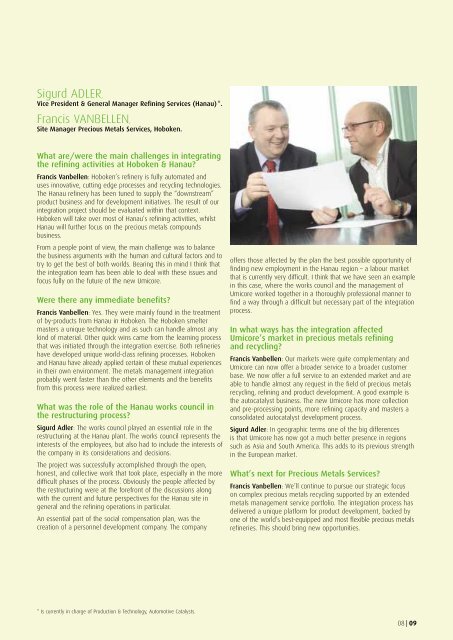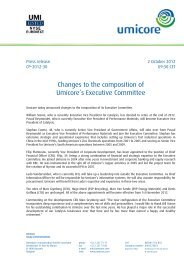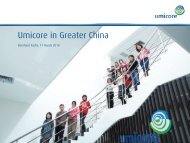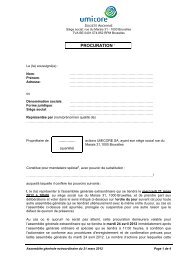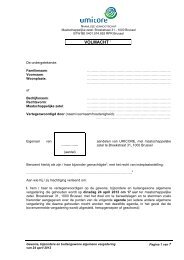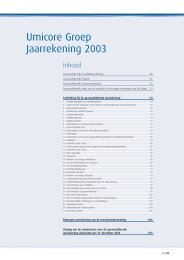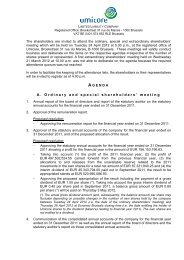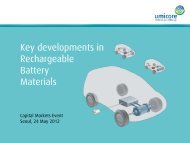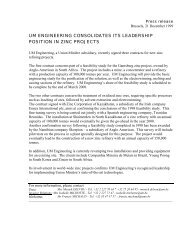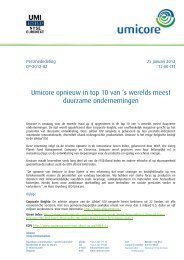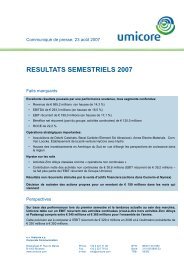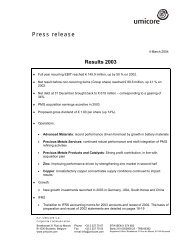You also want an ePaper? Increase the reach of your titles
YUMPU automatically turns print PDFs into web optimized ePapers that Google loves.
Sigurd ADLER,<br />
Vice President & General Manager Refining Services (Hanau)*.<br />
Francis VANBELLEN,<br />
Site Manager Precious Metals Services, Hoboken.<br />
What are/were the main challenges in integrating<br />
the refining activities at Hoboken & Hanau?<br />
Francis Vanbellen: Hoboken’s refinery is fully automated and<br />
uses innovative, cutting edge processes and recycling technologies.<br />
The Hanau refinery has been tuned to supply the “downstream”<br />
product business and for development initiatives. The result of our<br />
integration project should be evaluated within that context.<br />
Hoboken will take over most of Hanau’s refining activities, whilst<br />
Hanau will further focus on the precious metals compounds<br />
business.<br />
From a people point of view, the main challenge was to balance<br />
the business arguments with the human and cultural factors and to<br />
try to get the best of both worlds. Bearing this in mind I think that<br />
the integration team has been able to deal with these issues and<br />
focus fully on the future of the new Umicore.<br />
Were there any immediate benefits?<br />
Francis Vanbellen: Yes. They were mainly found in the treatment<br />
of by-products from Hanau in Hoboken. The Hoboken smelter<br />
masters a unique technology and as such can handle almost any<br />
kind of material. Other quick wins came from the learning process<br />
that was initiated through the integration exercise. Both refineries<br />
have developed unique world-class refining processes. Hoboken<br />
and Hanau have already applied certain of these mutual experiences<br />
in their own environment. The metals management integration<br />
probably went faster than the other elements and the benefits<br />
from this process were realized earliest.<br />
What was the role of the Hanau works council in<br />
the restructuring process?<br />
Sigurd Adler: The works council played an essential role in the<br />
restructuring at the Hanau plant. The works council represents the<br />
interests of the employees, but also had to include the interests of<br />
the company in its considerations and decisions.<br />
The project was successfully accomplished through the open,<br />
honest, and collective work that took place, especially in the more<br />
difficult phases of the process. Obviously the people affected by<br />
the restructuring were at the forefront of the discussions along<br />
with the current and future perspectives for the Hanau site in<br />
general and the refining operations in particular.<br />
An essential part of the social compensation plan, was the<br />
creation of a personnel development company. The company<br />
* Is currently in charge of Production & Technology, Automotive Catalysts.<br />
offers those affected by the plan the best possible opportunity of<br />
finding new employment in the Hanau region – a labour market<br />
that is currently very difficult. I think that we have seen an example<br />
in this case, where the works council and the management of<br />
Umicore worked together in a thoroughly professional manner to<br />
find a way through a difficult but necessary part of the integration<br />
process.<br />
In what ways has the integration affected<br />
Umicore’s market in precious metals refining<br />
and recycling?<br />
Francis Vanbellen: Our markets were quite complementary and<br />
Umicore can now offer a broader service to a broader customer<br />
base. We now offer a full service to an extended market and are<br />
able to handle almost any request in the field of precious metals<br />
recycling, refining and product development. A good example is<br />
the autocatalyst business. The new Umicore has more collection<br />
and pre-processing points, more refining capacity and masters a<br />
consolidated autocatalyst development process.<br />
Sigurd Adler: In geographic terms one of the big differences<br />
is that Umicore has now got a much better presence in regions<br />
such as Asia and South America. This adds to its previous strength<br />
in the European market.<br />
What’s next for Precious Metals Services?<br />
Francis Vanbellen: We’ll continue to pursue our strategic focus<br />
on complex precious metals recycling supported by an extended<br />
metals management service portfolio. The integration process has<br />
delivered a unique platform for product development, backed by<br />
one of the world’s best-equipped and most flexible precious metals<br />
refineries. This should bring new opportunities.<br />
08 | 09


